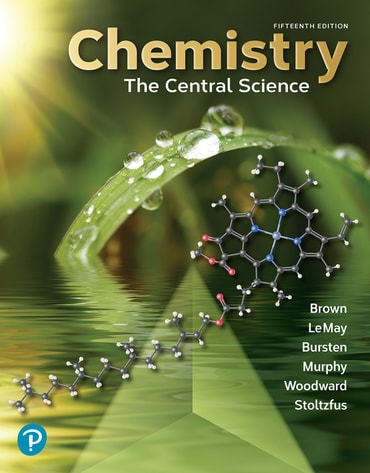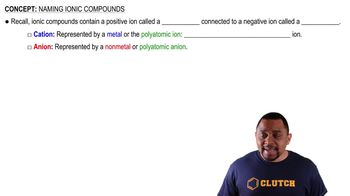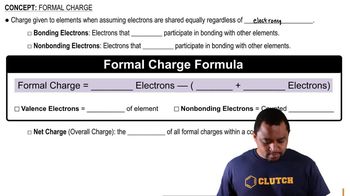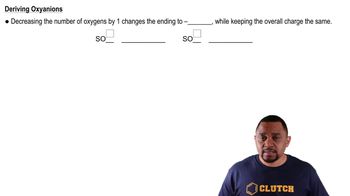Complete the table by filling in the formula for the ionic compound formed by each pair of cations and anions, as shown for the first pair. Ion Na+ Ca2+ Fe2+ Al3+ O2- Na2O NO3- SO42- AsO43-
Ch.2 - Atoms, Molecules, and Ions

Brown15th EditionChemistry: The Central ScienceISBN: 9780137542970Not the one you use?Change textbook
Chapter 2, Problem 62d
Predict the chemical formulas of the compounds formed by the following pairs of ions: (d) Ca2+ and ClO3-
 Verified step by step guidance
Verified step by step guidance1
Identify the charges on each ion: Calcium ion (Ca^{2+}) has a charge of +2, and chlorate ion (ClO_3^{-}) has a charge of -1.
To form a neutral compound, the total positive charge must balance the total negative charge.
Determine the ratio of ions needed to balance the charges. Since Ca^{2+} has a +2 charge and ClO_3^{-} has a -1 charge, you will need two ClO_3^{-} ions to balance one Ca^{2+} ion.
Write the chemical formula by placing the cation first followed by the anion, using subscripts to indicate the number of each ion needed. The formula will be Ca(ClO_3)_2.
Ensure the compound is neutral by checking that the total positive charge (+2 from one Ca^{2+}) equals the total negative charge (-2 from two ClO_3^{-}).

Verified video answer for a similar problem:
This video solution was recommended by our tutors as helpful for the problem above.
Video duration:
28sWas this helpful?
Key Concepts
Here are the essential concepts you must grasp in order to answer the question correctly.
Ionic Compounds
Ionic compounds are formed when positively charged ions (cations) and negatively charged ions (anions) combine. The electrostatic attraction between these oppositely charged ions results in the formation of a neutral compound. Understanding the charges of the ions involved is crucial for predicting the correct formula of the resulting compound.
Recommended video:
Guided course

Ionic Compounds Naming
Charge Balance
In ionic compounds, the total positive charge must balance the total negative charge to achieve electrical neutrality. For example, if a cation has a charge of +2, it will require two anions with a charge of -1 each to balance the charges. This principle is essential for determining the correct stoichiometry of the ions in the compound.
Recommended video:
Guided course

Formal Charge
Polyatomic Ions
Polyatomic ions are ions that consist of two or more atoms bonded together, carrying a net charge. In this case, ClO3- (chlorate) is a polyatomic ion with a -1 charge. Recognizing polyatomic ions and their charges is important for accurately predicting the formulas of compounds formed with other ions, such as Ca2+.
Recommended video:
Guided course

Polyatomic Ion Variations
Related Practice
Textbook Question
Textbook Question
Predict the chemical formula for the ionic compound formed by (e) Mg2+ and PO43-.
Textbook Question
Predict the chemical formulas of the compounds formed by the following pairs of ions: (b) Fe3+ and O2-
Textbook Question
Predict the chemical formulas of the compounds formed by the following pairs of ions: (c) Hg22+ and CO32-
Textbook Question
Predict the chemical formulas of the compounds formed by the following pairs of ions: (e) NH4+ and PO43-.
Textbook Question
Complete the table by filling in the formula for the ionic compound formed by each pair of cations and anions, as shown for the first pair. Ion K+ NH4+ Mg2+ Fe3+ Cl- KCl OH- CO32- PO43-
Complete the first row of the table.
Complete the second row of the table.
Complete the third row of the table.
Complete the fourth row of the table.
